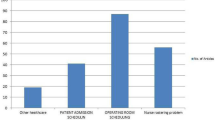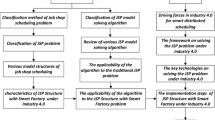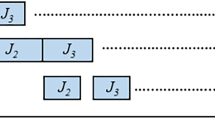Abstract
The focus of this study is to analyze position-based learning effects in single-machine stochastic scheduling problems. The optimal permutation policies for the stochastic scheduling problems with and without machine breakdowns are examined, where the performance measures are the expectation and variance of the makespan, the expected total completion time, the expected total weighted completion time, the expected weighted sum of the discounted completion times, the maximum lateness and the maximum tardiness.
Similar content being viewed by others
References
Anzanello, M. J., & Fogliatto, F. S. (2011). Learning curve models and applications: Literature review and research directions. International Journal of Industrial Ergonomics, 41, 573–583.
Birge, J., Frenk, J. B. G., Mittenthal, J., & Rinnooy Kan, A. H. G. (1990). Single-machine scheduling subject to stochastic breakdowns. Naval Research Logistics, 37, 661–677.
Biskup, D. (1999). Single-machine scheduling with learning considerations. European Journal of Operational Research, 115, 173–178.
Biskup, D. (2008). A state-of-the-art review on scheduling with learning effects. European Journal of Operational Research, 188, 315–329.
Cai, X., Sun, X., & Zhou, X. (2003). Stochastic scheduling with preemptive-repeat machine breakdowns to minimize the expected weighted flowtime. Probability in the Engineering and Informational Sciences, 17, 467–485.
Cai, X., Sun, X., & Zhou, X. (2004). Stochastic scheduling subject to machine breakdowns: The preemptive-repeat model with discounted reward and other criteria. Naval Research Logistics, 51, 800–817.
Cai, X., Wang, L., & Zhou, Xian. (2007). Single-machine scheduling to stochastically minimize maximum lateness. Journal of Scheduling, 10(4), 293–301.
Cai, X., Wu, X., & Zhou, X. (2005). Dynamically optimal policies for stochastic scheduling subject to preemptive-repeat machine breakdowns. IEEE Transactions on Automation Science and Engineering, 2, 158–172.
Cai, X., Wu, X., & Zhou, X. (2009). Stochastic scheduling subject to preemptive-repeat breakdowns with incomplete information. Operations Research, 57, 1236–1249.
Cai, X., Wu, X., & Zhou, X. (2011). Scheduling deteriorating jobs on a single machine subject to breakdowns. Journal of Scheduling, 14(2), 173–186.
Cai, X., & Zhou, X. (1999). Stochastic scheduling on parallel machine subject to random breakdowns to minimize expected costs for earliness and tardy cost. Operations Research, 47, 422–437.
Cai, X., & Zhou, X. (2000). Asymmetric earliness-tardiness scheduling with exponential processing times on an unreliable machine. Annals of Operations Research, 98, 313–331.
Chang, C., & Yao, D. (1993). Rearrangement, majorization and stochastic scheduling. Mathmatics of Operations Research, 18(3), 658–684.
Cheng, T. C. E., Ding, Q., & Lin, B. M. T. (2004). A concise survey of scheduling with time-dependent processing times. European Journal of Operational Research, 152, 1–13.
Glazebrook, K. D. (1984). Scheduling stochastic jobs on a single machine subject to breakdowns. Naval Research Logistics Quarterly, 31, 251–264.
Glazebrook, K. D. (1991). On nonpreemptive policies for stochastic single-machine scheduling with breakdowns. Probability in the Engineering and Informational Sciences, 5, 77–87.
Glazebrook, K. D., Assell, P. S., Dunn, R. T., & Lumley, R. R. (2004). On the optimal service to impatient tasks. Journal of Applied Probability, 41, 51–72.
Koulamas, C., & Kyparisis, G. J. (2007). Single-machine and two-machine flowshop scheduling with general learning functions. European Journal of Operational Research, 178, 402–407.
Kuo, W. H., & Yang, D. L. (2006). Minimizing the total completion time in a single machine scheduling problem with a time-dependent learning effect. European Journal of Operational Research, 174, 1184–1190.
Lee, W. C. (2011). Scheduling with general position-based learning curves. Information Science, 181, 5515–5522.
Mosheiov, G. (2001). Scheduling problems with a learning effect. European Journal of Operational Research, 52, 687–693.
Pinedo, M. (2008). Scheduling: Theory, algorithms, and systems (3rd ed.). Englewood Cliffs: Prentice Hall.
Righter, R. (1994). Scheduling. In M. Shaked & J. G. Shanthikumar (Eds.), Stochastic orders and their applications. Boston: Academic Press.
Shaked, M., & Shanthikumar, J. G. (2007). Stochastic orders. New York: Springer Science+Business Media LLC.
Wang, X., & Cheng, T. C. E. (2007). Single-machine scheduling with deteriorating jobs and learning effects to minimize the makespan. European Journal of Operational Research, 178, 57–70.
Wang, J., & Xia, Z. (2006). Flow shop scheduling with deteriorating jobs under dominating machines. Omega, 34(4), 327–336.
Wang, J. B., Wang, D., & Zhang, G. D. (2010). Single-machine scheduling with learning functions. Applied Mathematics and Computation, 216, 1280–126.
Wu, C. C., & Lee, W. C. (2009). Single-machine and flowshop scheduling with a general learning effect model. Computers and Industrial Engineering, 56, 1553–1558.
Wu, C. C., Yin, Y. Q., & Cheng, S. R. (2011). Some single-machine scheduling problems with a truncation learning effect. Computers and Industrial Engineering, 60, 790–795.
Wu, X., & Zhou, X. (2008). Stochastic scheduling to minimize expected maximum lateness. European Journal of Operational Research, 190(1), 103–115.
Yin, Y. Q., Xu, D. H., & Huang, X. K. (2011). Notes on “Some single-machine scheduling problems with general position-dependent and time-dependent learning effects”. Information Science, 181, 2209–2217.
Yin, Y. Q., Xu, D. H., Sun, K. B., & Li, H. G. (2009). Some scheduling problems with general position-dependent and time-dependent learning effects. Information Science, 179, 2416–2425.
Acknowledgments
This research was partially supported by the Natural Science Foundation of China under Grant No. 71071056, and the Australian Research Council Discovery Project Grant No. DP1094153.
Author information
Authors and Affiliations
Corresponding author
Rights and permissions
About this article
Cite this article
Zhang, Y., Wu, X. & Zhou, X. Stochastic scheduling problems with general position-based learning effects and stochastic breakdowns. J Sched 16, 331–336 (2013). https://doi.org/10.1007/s10951-012-0306-9
Received:
Accepted:
Published:
Issue Date:
DOI: https://doi.org/10.1007/s10951-012-0306-9




